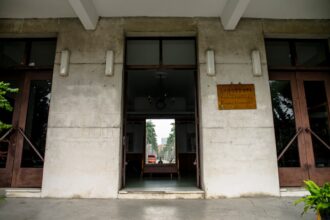Admiral Hyman G. Rickover, often referred to as the “Father of the Nuclear Navy,” left an indelible mark on the field of nuclear engineering and military operations. His vision and relentless pursuit of excellence transformed the United States Navy’s approach to nuclear propulsion, establishing a framework that would influence generations of engineers and naval officers.
Rickover’s legacy is not merely confined to the technological advancements he championed; it encompasses a philosophy of rigorous training, accountability, and ethical responsibility that continues to resonate in today’s engineering disciplines. Rickover’s insistence on high standards and his unique approach to leadership fostered a culture of innovation and safety within the Navy. He was known for his hands-on involvement in the training of personnel, emphasizing the importance of understanding the intricacies of nuclear technology.
This commitment to education and mentorship laid the groundwork for a new generation of engineers who would carry forward his principles, ensuring that safety and efficiency remained paramount in nuclear operations. The legacy of Admiral Rickover is a testament to the profound impact one individual can have on an entire field, shaping not only the technology but also the values that guide its practitioners.
Key Takeaways
- Admiral Rickover’s legacy in nuclear engineering training is profound and far-reaching.
- Nuclear engineering training is of utmost importance for the safety and advancement of the industry.
- The foundational principles of Rickover’s method emphasize discipline, accountability, and attention to detail.
- Mentorship plays a crucial role in Rickover’s method, shaping the next generation of nuclear engineers.
- The rigorous academic curriculum of Rickover’s method ensures a strong theoretical foundation for students.
The Importance of Nuclear Engineering Training
In an era where nuclear technology plays a pivotal role in energy production and national defense, the importance of comprehensive nuclear engineering training cannot be overstated. As the complexities of nuclear systems continue to evolve, so too must the educational frameworks that prepare engineers to navigate these challenges. Rigorous training programs are essential for equipping future professionals with the knowledge and skills necessary to ensure safe and effective operation within this high-stakes environment.
Nuclear engineering training encompasses a wide array of disciplines, including physics, materials science, and thermodynamics, all of which are critical for understanding the behavior of nuclear reactors and their components. Furthermore, as global energy demands increase, the need for innovative solutions in nuclear technology becomes ever more pressing. A well-structured training program not only imparts technical knowledge but also fosters critical thinking and problem-solving abilities, enabling engineers to address emerging challenges in the field effectively.
The Foundational Principles of Rickover’s Method
At the core of Admiral Rickover’s approach to nuclear engineering education are several foundational principles that have stood the test of time. One of these principles is the unwavering commitment to excellence. Rickover believed that mediocrity was unacceptable in any aspect of nuclear operations, from design to implementation.
This philosophy instilled a sense of pride and responsibility among those who trained under him, encouraging them to strive for perfection in their work.
Rickover understood that in the realm of nuclear technology, even minor oversights could lead to catastrophic consequences.
As such, he fostered an environment where individuals were held responsible for their actions and decisions. This culture of accountability not only enhanced safety but also encouraged engineers to take ownership of their work, leading to a more engaged and motivated workforce.
The Role of Mentorship in Rickover’s Method
| Metric | Data |
|---|---|
| Number of Mentors | 10 |
| Number of Mentees | 50 |
| Success Rate | 80% |
| Retention Rate | 90% |
Mentorship played a crucial role in Rickover’s method, serving as a cornerstone for developing future leaders in nuclear engineering. Admiral Rickover was known for his hands-on approach, often personally overseeing the training and development of his subordinates. He believed that effective mentorship was essential for nurturing talent and instilling the values necessary for success in the field.
Through mentorship, Rickover imparted not only technical knowledge but also life lessons that shaped the character of his mentees.
This approach not only cultivated a sense of camaraderie among team members but also ensured that diverse perspectives were considered in decision-making processes, ultimately leading to more robust solutions in nuclear engineering.
The Rigorous Academic Curriculum of Rickover’s Method
The academic curriculum designed by Admiral Rickover was characterized by its rigor and depth, reflecting his belief that a strong theoretical foundation was essential for success in nuclear engineering. The curriculum encompassed a wide range of subjects, including advanced mathematics, fluid dynamics, and reactor physics, all tailored to provide students with a comprehensive understanding of nuclear systems. Rickover’s method also emphasized interdisciplinary learning, encouraging students to explore connections between various fields of study.
This holistic approach not only enriched their educational experience but also prepared them to tackle complex problems that often require insights from multiple disciplines. By fostering a culture of intellectual curiosity and critical thinking, Rickover’s curriculum laid the groundwork for engineers who could innovate and adapt in an ever-changing technological landscape.
The Emphasis on Practical Experience in Nuclear Engineering Training
In addition to a rigorous academic curriculum, Admiral Rickover placed significant emphasis on practical experience as an integral component of nuclear engineering training. He understood that theoretical knowledge alone was insufficient; hands-on experience was essential for developing the skills necessary to operate complex nuclear systems safely and effectively. To this end, Rickover championed extensive laboratory work and real-world simulations as part of the training process.
Trainees were exposed to various scenarios that mirrored actual operational challenges, allowing them to apply their theoretical knowledge in practical settings. This experiential learning not only reinforced their understanding but also built confidence in their abilities to respond to emergencies and make critical decisions under pressure.
The Focus on Safety and Ethical Responsibility in Rickover’s Method
Safety was paramount in Admiral Rickover’s philosophy, reflecting his deep understanding of the potential risks associated with nuclear technology. He instilled a culture of safety that permeated every aspect of training and operations, emphasizing that engineers must prioritize safety above all else. This focus on safety was not merely procedural; it was ingrained in the very ethos of those who trained under him.
Moreover, Rickover recognized that ethical responsibility was equally important in the field of nuclear engineering. He believed that engineers must not only possess technical expertise but also uphold high ethical standards in their work. This dual focus on safety and ethics ensured that graduates from Rickover’s program were not only skilled professionals but also conscientious individuals committed to making responsible decisions that would impact society positively.
The Impact of Rickover’s Method on the Nuclear Engineering Industry
The influence of Admiral Rickover’s method extends far beyond the confines of the U.S. Navy; it has had a profound impact on the broader nuclear engineering industry as well. His emphasis on rigorous training, accountability, and ethical responsibility has become a benchmark for educational programs worldwide.
Many institutions have adopted elements of Rickover’s approach, recognizing its effectiveness in producing competent and responsible engineers. Furthermore, Rickover’s legacy has shaped industry standards and practices related to safety and operational excellence. His insistence on thorough training and continuous improvement has led to advancements in safety protocols and risk management strategies across various sectors involving nuclear technology.
As a result, organizations have become more adept at navigating the complexities associated with nuclear systems while prioritizing public safety and environmental stewardship.
The Evolution of Rickover’s Method in Modern Nuclear Engineering Education
As technology continues to advance at an unprecedented pace, the principles established by Admiral Rickover have evolved to meet contemporary challenges in nuclear engineering education. Modern programs now incorporate cutting-edge technologies such as computer simulations and virtual reality training tools that enhance experiential learning opportunities for students. Additionally, there is a growing recognition of the importance of interdisciplinary collaboration in addressing complex global issues related to energy production and sustainability.
Many educational institutions have begun integrating courses on environmental science, policy analysis, and social responsibility into their nuclear engineering curricula, reflecting a broader understanding of the role engineers play in society today.
The Success Stories of Graduates from Rickover’s Method
The success stories of graduates from Admiral Rickover’s method serve as powerful testaments to the effectiveness of his training philosophy. Many individuals who trained under Rickover have gone on to achieve remarkable careers in various sectors, including academia, government agencies, and private industry. Their accomplishments reflect not only their technical expertise but also the values instilled in them during their formative years as engineers.
These graduates often cite their experiences under Rickover as pivotal moments in their professional development. They speak highly of the rigorous training they received, which prepared them to tackle complex challenges with confidence and integrity. Moreover, many attribute their commitment to safety and ethical responsibility directly to the principles emphasized by Admiral Rickover during their education.
The Future of Nuclear Engineering Training: Building on Rickover’s Legacy
Looking ahead, the future of nuclear engineering training will undoubtedly continue to build upon Admiral Rickover’s legacy while adapting to new challenges and opportunities. As global energy demands shift and concerns about climate change intensify, there will be an increasing need for innovative solutions within the nuclear sector. Educational programs must remain agile, incorporating emerging technologies and interdisciplinary approaches that reflect these evolving needs.
Moreover, as diversity and inclusion become central themes across industries, there is an opportunity for nuclear engineering education to embrace these values actively. By fostering an inclusive environment that welcomes diverse perspectives, programs can cultivate a new generation of engineers who are not only technically proficient but also equipped to address societal challenges with empathy and creativity. In conclusion, Admiral Hyman G.
Rickover’s legacy continues to shape the field of nuclear engineering education profoundly. His commitment to excellence, accountability, mentorship, safety, and ethical responsibility has left an enduring impact on both individuals and institutions alike. As future generations build upon this foundation, they will undoubtedly carry forward Rickover’s principles while adapting them to meet the demands of an ever-changing world.
Admiral Hyman G. Rickover, often referred to as the “Father of the Nuclear Navy,” was instrumental in shaping the training and development of nuclear engineers. His rigorous standards and innovative approaches ensured that the U.S. Navy’s nuclear program was both safe and effective. For a deeper understanding of Rickover’s methods and their impact on nuclear engineering, you can explore a related article on this topic by visiting In The War Room. This article provides insights into the unique training techniques and leadership principles that Rickover employed to cultivate a generation of highly skilled nuclear engineers.
WATCH THIS! America’s Nuclear Navy Was Born From Espionage
FAQs
What was Rickover’s role in training nuclear engineers?
Admiral Hyman G. Rickover was instrumental in establishing the nuclear navy and played a key role in training nuclear engineers for the U.S. Navy’s nuclear propulsion program.
What methods did Rickover use to train nuclear engineers?
Rickover implemented a rigorous and demanding training program that included classroom instruction, hands-on experience, and a strong emphasis on safety and attention to detail.
What was the impact of Rickover’s training program on the field of nuclear engineering?
Rickover’s training program produced a generation of highly skilled and disciplined nuclear engineers who played a crucial role in the development and operation of nuclear-powered submarines and aircraft carriers.
How did Rickover’s training program contribute to the safety of nuclear propulsion systems?
Rickover’s emphasis on safety and attention to detail instilled a culture of excellence and accountability among nuclear engineers, which contributed to the safe and reliable operation of nuclear propulsion systems in the U.S. Navy.




